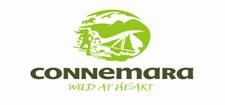Essential Equipment for Hiking in ConnemaraBootsWe cannot emphasise strongly enough the importance of proper hiking boots. Most of our walks are “off trail” and the terrain can vary from wet bogland to exposed cliffs and loose rocky scree. For safety reasons, it is essential to have strong hiking boots with good grip and ankle support which should be waterproof. "Trekking shoes" are not safe for hiking in the mountains or even on the rough trails of Connemara. In the picture below, the boots on the left are the best type for hiking in the Connemara mountains; they are waterproof, have good ankle support and "Vibram" soles, which give excellent grip. The boots shown on the right are adequate for most hikes as they have ankle support, waterproofing and a good grip.
ClothingThe weather can change very quickly in the West of Ireland, especially in the mountains, so it is essential to have suitable clothing. Waterproof jackets and leggings/overtrousers are always required, even if the weather seems good when you set out. Breathable waterproofs are recommended. Denim jeans should never be worn for hiking as they hold onto moisture, and if they get wet you will get cold. If we get delayed on the mountain there is a risk that wet denims will bring about hypothermia. If you turn up in denims, you cannot be guaranteed to participate in our hikes. For your trousers and base layer, non-cotton hiking or sports clothing is best as it dries out quickly draws sweat away from your body. Shorts are not recommended as you may have to walk through rough vegetation such as heather and gorse, and there may be ticks present from deer and sheep (there is a small risk of Lymes' disease). Gaiters are recommended as they provide excellent protection for your lower legs and also help to keep your feet dry. Air temperatures in the mountains are several degrees lower than at sea level, and there can be considerable wind-chill on exposed mountain-tops. You should always bring extra layers of clothing, such as a “fleece” in your backpack. You will also need a hat and gloves – even in the summer! While your guide will be prepared for emergencies, you have to be prepared for the possibility that we will be delayed on the mountain.Food and WaterFor any hike longer than 2-3 hours, you will need to bring food and water. It's always a good idea to bring a little bit more than you think you'll need. Hiking makes you hungry and thirsty! While the water in the high-up streams is of high quality it can contain small quantities of animal contamination. Some people have no problem in drinking such water, however many visitors find it preferable to bring bottled water. BackpackFor any mountain hike you will need to bring a backpack (or "day pack") to carry your food, water and extra clothing. Hiking PolesHiking poles are strongly recommended for both safety and comfort. We can normally supply poles or a walking stick. Face maskYou will need to bring a face mask in case a situation arises where you cannot practise social distancing. FinallyIf our guide judges that a participant is not correctly equipped, they may be refused participation for their own safety. |

The view of the Twelve Bens mountains from Roundstone Bog
contact:
walkconnemara@gmail.com
Mobile: 087 6291659
| Home
| Booking
Enquiries | Walk
Details | Scheduled
Walks
|
Guide Book
| Local
Links
| News
&
Events |
| Terms and Conditions | Data Privacy |
| Terms and Conditions | Data Privacy |
website by Brigid Sealy
© Paul Phelan 2016


